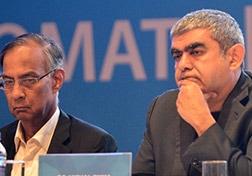
BENGALURU - Global software major Infosys Ltd has embarked on a three-pronged transformation journey for a sustainable and secure future, said its Board Chairman R. Seshasayee on Saturday at the company's 36th Annual General Meeting (AGM) here. "We are undertaking three transformations simultaneously for a sustainable and secure future for your company. The first is business transformation from a traditional IT services...

to an innovation-led software-plus services company, which is formidable enough; second the cultural transformation that comes along when you induct global leadership talent; and third, the abrupt transition from the promoter-led Board to an independent Board," he told about 1,000 shareholders at the AGM.
Admitting that none of the transformations were easy, Seshasayee said other industry players might have one or the other, but not all the three and underlaid the board and the management's commitment to accelerated efforts to navigate the company through these daunting changes and deliver performance.
Noting that Infosys was at a defining moment, he said it was at the cusp of the fourth industrial revolution, with all prospects for human advancement and new business opportunities.
"The rapid digitisation of everything around us is disrupting entire industries in an irreversible and profound way. As this revolution accelerates, the opportunity for us is two-fold.
"First, to bring automation and software-led efficiencies to the core of our traditional services, whilst rapidly learning to imbibe new technologies and innovation. Second, to do the same for our clients as we partner with them through their digital transformation."
Seshasayee said the twin-approach would bring technology-enabled efficiencies to the clients problem-solving and freeing them to find new opportunities to create greater value.
"Our endeavour is to deliver our traditional services through a people plus software model so that our engineers can focus on higher-value work and on innovating for our clients," he said.
Asserting that the progress in the fiscal under review was encouraging, he said navigating through the year was not without challenges posed by the external environment due to "growing commoditisation of our traditional business, rapidly spreading protectionism and escalating demand from clients for more value for their technology investments".
"Our strategy had to quickly evolve to respond to changing dynamics in the marketplace and our execution had to be elevated to a higher level of efficiency," he said. The company has set up a Committee of Directors to monitor execution and enhance alignment between the board and the management in strategic responses to the changing market situations. The chairman also referred to the challenges the company faced during the last 18 months, including intense criticism of the board and management's "governance lapses". "Executive leadership compensation was an issue that dominated the narrative on governance. The Board has, in the spirit of further transparency, released a document, explaining in detail the policy on executive compensation, the key performance indicators for variable pay and related matters on the company's website and in the annual report," added Seshasayee.
Admitting that none of the transformations were easy, Seshasayee said other industry players might have one or the other, but not all the three and underlaid the board and the management's commitment to accelerated efforts to navigate the company through these daunting changes and deliver performance.
Noting that Infosys was at a defining moment, he said it was at the cusp of the fourth industrial revolution, with all prospects for human advancement and new business opportunities.
"The rapid digitisation of everything around us is disrupting entire industries in an irreversible and profound way. As this revolution accelerates, the opportunity for us is two-fold.
"First, to bring automation and software-led efficiencies to the core of our traditional services, whilst rapidly learning to imbibe new technologies and innovation. Second, to do the same for our clients as we partner with them through their digital transformation."
Seshasayee said the twin-approach would bring technology-enabled efficiencies to the clients problem-solving and freeing them to find new opportunities to create greater value.
"Our endeavour is to deliver our traditional services through a people plus software model so that our engineers can focus on higher-value work and on innovating for our clients," he said.
Asserting that the progress in the fiscal under review was encouraging, he said navigating through the year was not without challenges posed by the external environment due to "growing commoditisation of our traditional business, rapidly spreading protectionism and escalating demand from clients for more value for their technology investments".
"Our strategy had to quickly evolve to respond to changing dynamics in the marketplace and our execution had to be elevated to a higher level of efficiency," he said. The company has set up a Committee of Directors to monitor execution and enhance alignment between the board and the management in strategic responses to the changing market situations. The chairman also referred to the challenges the company faced during the last 18 months, including intense criticism of the board and management's "governance lapses". "Executive leadership compensation was an issue that dominated the narrative on governance. The Board has, in the spirit of further transparency, released a document, explaining in detail the policy on executive compensation, the key performance indicators for variable pay and related matters on the company's website and in the annual report," added Seshasayee.

 RSS Feed
RSS Feed
